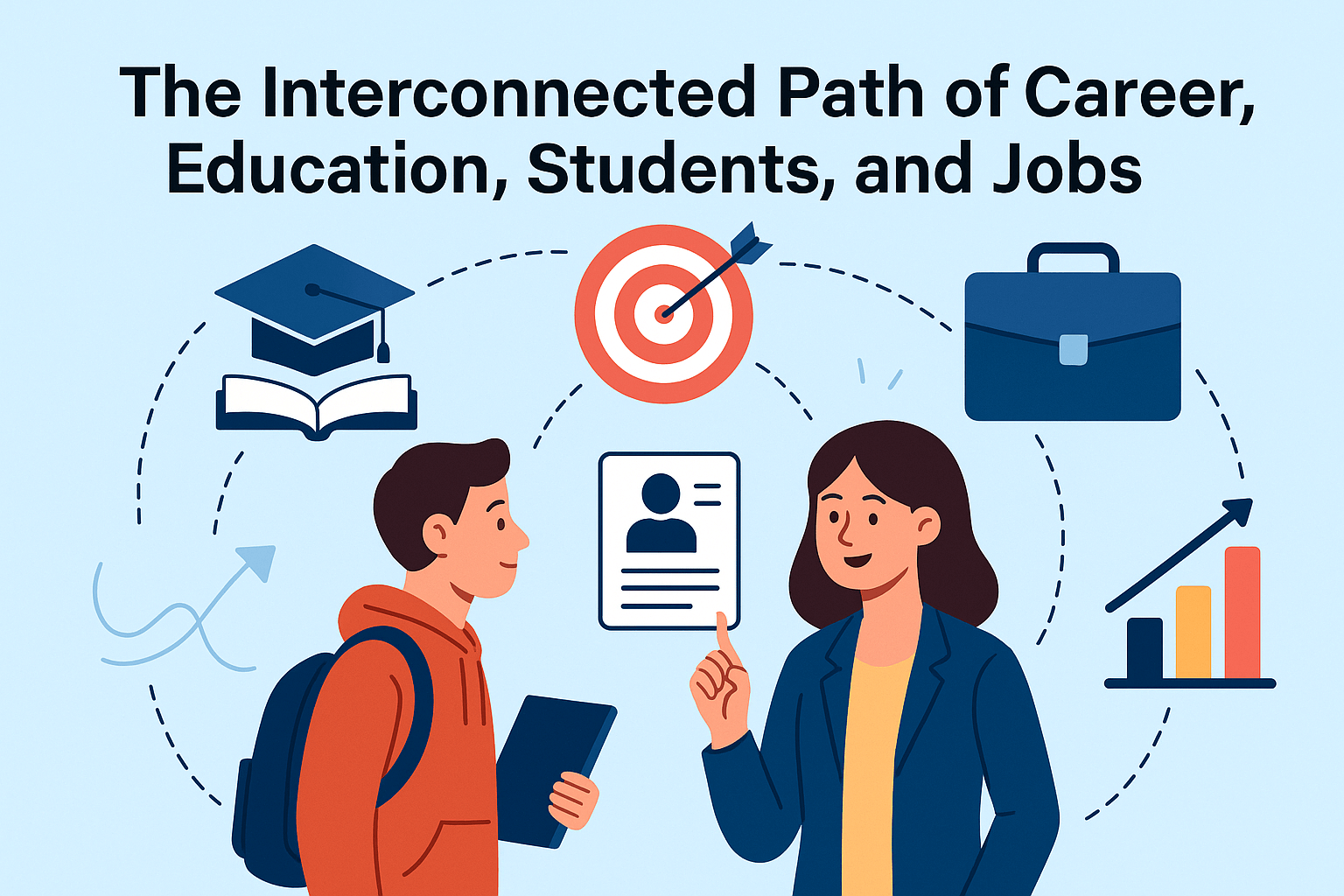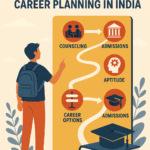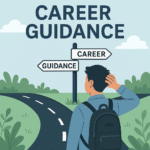Career choices, educational paths, student experiences, and job markets are deeply connected. In today’s competitive and rapidly evolving world, individuals—especially students—face a complex web of decisions. Each choice, from the selection of a university course to a first job role, carries lasting consequences. For many, the journey from classroom to career is no longer linear. It is layered, with frequent turns, temporary pauses, and occasional reboots.
This article examines how education and student experiences shape career readiness, how job trends impact academic decisions, and why continuous learning is more important than ever in a world where industries shift overnight.
Read:- Highest Paying Jobs in India
1. Education as a Career Foundation
Formal education has long been viewed as the gateway to stable employment. For centuries, academic institutions have prepared students for the demands of specific trades or professions. Today, however, this role is under scrutiny.
With the rise of automation, AI, and gig-based economies, employers no longer prioritise degrees alone. Instead, they look for adaptable individuals with relevant skills, problem-solving abilities, and communication strengths.
Still, structured education offers foundational knowledge, critical thinking ability, and exposure to disciplines that remain vital in most professions.
Key takeaway: Education alone doesn’t secure a career, but it remains a crucial base that supports long-term growth and learning.
2. Student Life and Career Awareness
Many students begin their academic journey without a clear picture of their future career. While some have clarity from an early stage, a majority change their minds multiple times before graduating.
Career guidance at the school and university level plays a critical role here. Institutions that offer counselling sessions, internships, and career fairs give students real exposure to different industries. This helps align academic efforts with market demands.
Moreover, participation in extracurricular activities—debating clubs, coding bootcamps, or business case competitions—can reveal hidden talents and boost self-awareness, traits essential for workplace success.
Key takeaway: Early exposure to workplace concepts through student activities and guidance improves long-term career outcomes.
3. Skills Over Degrees
There was a time when a single degree could carry someone through an entire career. That is no longer the case. Employers are now more focused on abilities than academic credentials alone.
According to multiple job trend studies, the most sought-after skills include communication, digital literacy, problem-solving, time management, and collaboration. These are often developed through experience rather than textbooks.
For students, this implies the need to seek real-world engagement even during college. Freelancing, internships, volunteer work, or even running a small online business can teach more about working under pressure than many formal lectures.
Key takeaway: Skills acquired through practical experience are valued as highly, sometimes more than academic qualifications in the job market.
4. Career Planning in a Dynamic World
Career planning used to be about selecting a field and sticking with it for life. Today, professionals often change roles, industries, or even entire careers multiple times.
Students should understand that long-term career planning must remain flexible. Instead of fixating on a specific job title, it’s more effective to think in terms of interests, strengths, and adaptable skill sets.
For example, someone passionate about healthcare doesn’t necessarily need to become a doctor. They might thrive as a health data analyst, a medical content writer, or even a wellness app developer. The modern job market supports such flexibility.
Key takeaway: Flexibility in career planning allows students to adjust to changing trends without compromising on personal interests.
Read more:- Career after MBA in Finance
5. The Role of Internships and Apprenticeships
Internships and apprenticeships offer a practical glimpse into the working world. They bridge the gap between theory and practice, allowing students to apply their knowledge in real scenarios.
Employers also prefer candidates who already understand workplace etiquette, deadlines, and team structures. Many even hire their interns full-time based on performance.
In countries with dual-education systems, apprenticeships are often paid and provide students with hands-on learning alongside their formal education. This approach reduces skill gaps and unemployment rates.
Key takeaway: Real-world experience through internships or apprenticeships often becomes the deciding factor in landing full-time employment.
6. Digital Platforms and Job Readiness
LinkedIn, Coursera, GitHub, and similar platforms have changed how students prepare for the workforce. Students now have tools to learn independently, showcase their projects, and connect directly with recruiters.
A student interested in software development can build a portfolio on GitHub. A design student can share their work on Behance. A future marketer can build a personal blog or analyse data through Google tools.
Even certifications in digital marketing, project management, or cloud computing gained outside of traditional university programs are valued in job applications.
Key takeaway: Students who actively use digital platforms to learn and share their work often stand out in competitive job applications.
7. Mental Health and Career Pressure
The pressure to choose the “right” career early and succeed quickly is enormous. Many students struggle with stress, anxiety, and fear of failure.
Institutions must recognise this and support students through counselling, peer mentorship, and wellness programmes. Likewise, families and communities should avoid placing unrealistic expectations on students.
Career journeys take time. Success is rarely instant. Helping students understand this reduces mental health burdens and builds resilience.
Key takeaway: Mental wellbeing is directly tied to career success—support systems during student life are essential.
Read more:- ANM vs GNM
8. The Rise of Alternative Careers
The digital economy has introduced careers that did not exist a decade ago. Content creators, data scientists, ethical hackers, UI/UX designers, and app developers are just a few examples.
This shift allows students to pursue work that aligns with their passions and strengths rather than conforming to traditional options. Academic institutions must keep pace by updating curricula, inviting industry experts, and integrating digital skills into all fields, not just IT or commerce.
For example, agriculture students can benefit from drone technology training. Literature students may gain valuable job skills through digital publishing or scriptwriting workshops.
Key takeaway: Students now have the opportunity to build careers in emerging fields, provided their education system and mentors support these pursuits.
9. Globalisation and Remote Work
Remote work is now a standard offering in many sectors. A student in India can work for a company in the UK, the USA, or Australia without relocating. This opens up opportunities but also intensifies competition.
Students need strong communication skills, time zone awareness, and a good grasp of digital collaboration tools. They must also understand global workplace etiquette, which may differ from their local norms.
Additionally, global exposure during education, such as international exchange programmes, can give students an edge.
Key takeaway: Understanding and adapting to global job trends expands opportunities beyond local markets.
10. Continuous Learning Beyond Graduation
Graduating from university is no longer the end of formal learning. Certifications, online courses, and self-study are now part of every professional’s life.
Employers prefer individuals who keep updating their knowledge. Many provide learning allowances or internal platforms to support this. Students who adopt this mindset early are better prepared to remain relevant throughout their careers.
Fields such as cybersecurity, blockchain, digital marketing, and AI demand constant learning due to their fast-moving nature.
Key takeaway: The ability to learn continuously is what keeps professionals valuable in long-term careers.
Conclusion
Education, student experiences, career paths, and job market realities form a continuous cycle. Each stage influences the next. Students who understand this early, seek guidance, gain experience, and stay adaptable will find meaningful work, regardless of how industries shift.




Comments
0 comments